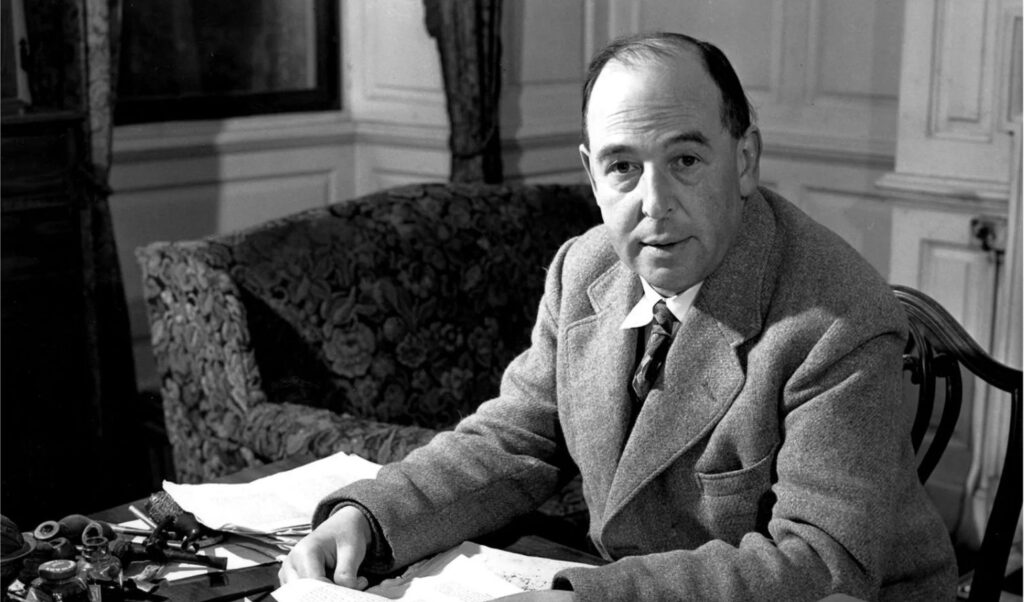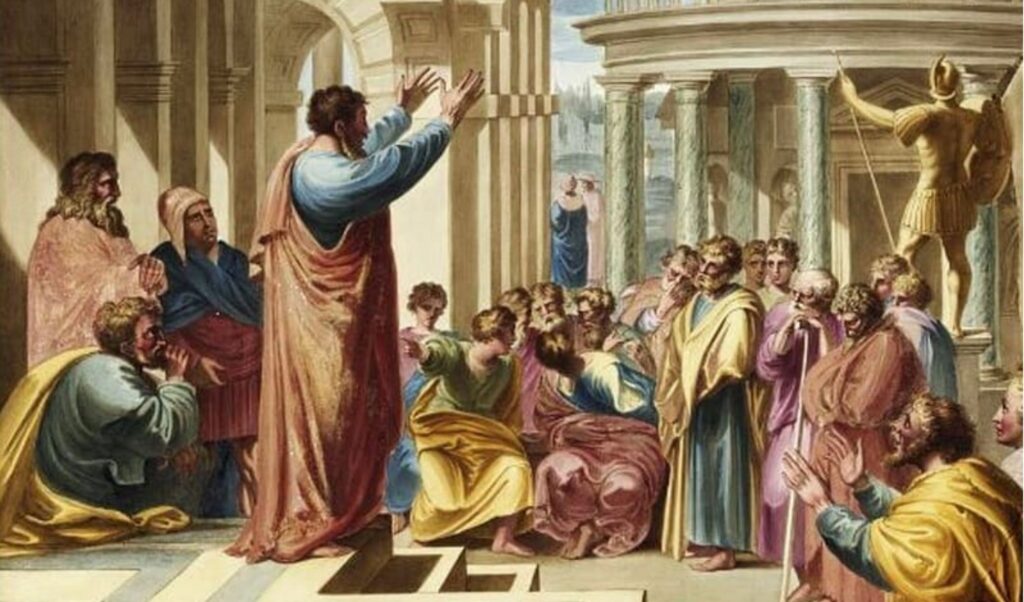Happy Anniversary
But when we have found the road and are passing signposts every few miles, we shall not stop and stare. They will encourage us, and we shall be grateful to the authority that set them up. But we shall not stop and stare, or not much; not on this road. Though their pillars are of silver and their lettering of gold, ‘We would be at Jerusalem.’
– C. S. Lewis
I Missed My 10-Year Anniversary
In December of 2022 I reached 10 years following Jesus and I did not even notice. I have been meaning to say something about the 10 years since, and have often thought of the ending of C. S. Lewis’ autobiography, Surprised by Joy. “Joy” was the name he gave to the brief tastes of another world that reached him along his journey to Christ. Something he wanted to grasp hold of but could not. The memory of a memory, it would turn out. Once God finally came to terms with him, and he set his sights on Jerusalem, he did not think so much about “joy” anymore: “not on this road.” I feel a little like that with my 10-year anniversary. How long I have been on the road is not nearly as interesting as the road itself has been, or where it is leading. Perhaps that is why I missed the milestone.

Nevertheless, I learned things. I have been surprised by many things. In the beginning it seemed that every week I was either learning something about Christianity I did not know was there, or unlearning something that I (or others) had put there and should not have. I have been surprised at times that I am still a Christian. My life before Christ was characterised by change and impermanence. ‘Mr. Anderson, why do you persist?’ I do not feel as though I have persisted, really. Christ has done the persisting. Which is only right since He did the insisting at the outset. It is because of this reality that I do not expect to ever not be a Christian. (That is a very positive point made with a double negative. Why do people apologize for the use of double negatives? I quite like them) Which is a strange thought to be in possession of after 35 years of life, when I now know well that we really do not know what is coming around the bend.
So, a brief recap of the highlights of the journey in, and some of the journey on, is in order. It is mainly intellectual since this is the door that God knocked on to rouse me. He had His reasons.
When You’re (Very) Late to the Party
The very first moment of intrigue was my realization that Christians had thought about the whole enterprise before. Chesterton describes discovering that Christianity had already thought all the good thoughts he thought he was thinking up himself.
“I am the fool of this story, and no rebel shall hurl me from my throne. I freely confess all the idiotic ambitions of the end of the nineteenth century. I did, like all other solemn little boys, try to be in advance of the age. Like them I tried to be some ten minutes in advance of the truth. And I found that I was eighteen hundred years behind it… I did try to found a heresy of my own and when I had put the last touches to it, I discovered that it was orthodoxy.”
– Chesterton, Orthodoxy

I was not remotely as noble. I just thought Christians had not thought at all. You may be willing to forgive my arrogance since it was founded upon pure ignorance. I simply did not know Christianity was a thinking thing. I did not know it had multiple intertwining traditions of profound and sustained reflection; reflection on the world around us, the human condition, the questions that move us as human beings in our depths; interpretation of the Bible that opened up the teachings of the Bible like a new world that could be explored and inhabited. I remember asking what I thought were tough questions to a pair of gentle, patient Christians, and hearing calm, coherent responses. It was quite inconvenient to have my concerns addressed so soundly by these good people. I was patient with their patience.
Explanatory Power
They introduced me to C. S. Lewis. And as is the case with many others, my life was never the same again. When I discovered myself in his examples of people appealing to objective moral laws I was aghast. I had to this point only exploited these “laws” for my own purposes. It had not occurred to me that if the laws were really there they would sooner or later have something to say about me. Once one feels the logic, that our sense of a crooked line implies the reality of a straight one, the game may not be up, but it is most definitely afoot. But the most stirring concept I encountered in Lewis was that of ‘explanatory power’. Lewis’ famous statement is this:
“I believe in Christianity not simply because I see it, but because by it I see everything else.”
– Lewis, Mere Christianity

The claim is that Christianity makes sense of the world. Or to put it another way: in a world shrouded in darkness, Christianity turns on the light. Or perhaps even better: in a world with many shadows, Christianity gives a satisfying account of what casts the shadows. Having begun to ask (for the first time in my life) big questions, Christianity, it turns out, traffics in big answers.
The Lines on My Forehead
I always had a sense that I was a very confused person. I joked with myself (yes, I am an only child) that the reason I had wrinkles on my forehead from very young was that I was always frowning. And I was always frowning because I was always confused. In other words: it wasn’t my fault. But as I say, I knew I was confused. But I had not given much thought to the possibility of encountering answers, being confronted with explanations for the perplexing phenomena of life. But confronted I was. Consider these highlights.
More
Phenomenon: that longing most people have down in their depths for something more?
Explanation: it is there because we were made by Someone who is very much more. In fact, we were made for Him. Which in the early days of “exploring” faith is an alarming thought. And, yet, somehow it is also a comforting thought. We are not unspoken for in this world. We are lost property in the most important sense of the term: Someone is trying to find us (think Hawkeye in The Last of the Mohicans, not Bryan Mills in Taken).

Evil
Phenomenon: that terrifying inclination inside us that corresponds too closely with the horrors we see on the news? That which we call “evil” in others, but become very philosophical about when we see it in ourselves?
Explanation: it is evil. And it is the radiation blast from an ancient rupture that introduced sin, suffering, and death into our world. There is a real, historical, origin and explanation for one of the most pressing realities in human life. There is a Devil in the world, and he got to us.
Guilt
Phenomenon: that feeling that our wrongdoing rises all the way to the top? The guilt and shame we associate with bad behaviour from childhood? The feeling that we are not right with a very important Person whether we believe He is actually there or not and that it cannot be ignored by Him or remedied by us?
Explanation: we are not right with God. And it is a big deal. The biggest. But more than that, a provision has been made for guilt and shame. Sin has taken up residence within us. But a Saviour has taken up residence in the world. On these and other questions I began to look through Christianity (as one looks through a lens) and to my surprise and joy I could finally make sense of what I saw.
Fine-Tuning
In addition to Lewis I encountered more modern apologetics of an evidentialist kind in the philosopher William Lane Craig. Whatever else I say here, it was exhilarating to see someone on the Christian side of the argument who could take opponents into the championship rounds. Depending on the opponent the fight looked more like one of Mike Tyson’s early outings. And I say exhilarating not because at that time I was rooting for Christianity. I was hesitant and sceptical. What excited me was that the other side could actually make a fight of it. In arm wrestling (yes, it is a real thing and worth knowing about), when both opponents have won a round, the commentator will often say, “we have a match!” They are not rooting for anyone in particular. But it is good to get a proper scrap.

Anyhow, one of the first arguments Craig exposed me to is known as the fine-tuning argument. The idea is simple and powerful. The life-permitting parameters of our universe are so infinitesimally narrow that the presence of said parameters is suggestive of design (as opposed to chance or necessity). Or to put it another way, these life-permitting parameters are more likely given theism than naturalism. The more one considers the mind-boggling precision of these measurements the more difficult it is to avoid the theistic inference.
“The constants and quantities of the laws of nature fall into an extraordinarily narrow life-permitting range. Were these constants or quantities to be altered by even a hair’s breadth, the life-permitting balance would be destroyed, and life could not exist. For example, a change in the strength of the strong nuclear force or the electromagnetic force by only one part in 10¹⁰⁰ [this number represents a 1 followed by 100 zeroes!] would have prevented the existence of life.”
— Craig, Reasonable Faith
Goldilocks is sometimes evoked to convey the point. The parameters of our universe are not too hot (if they were, by a staggeringly small degree, we would not have a life-permitting universe) or too cold (see the previous parentheses) but rather “just right.” Or apply the Goldilocks illustration in an even simpler way, we find this world the way Goldilocks found the entire table containing the porridge. It looked very much like it was prepared by someone, like it was expecting her. Little did she know it was expecting three bears, and not prepared for her in the slightest. But the point is: the table looked prepared because it was.

My world expanded in the face of this argument. The God I was inquiring about might not be the parodied god I had been catechized in by film and television. He might be the owner and sustainer of the space-time continuum. It was potentially a big deal. And it should not go unsaid that this argument is often cited by respected critics as requiring some sleeve rolling.
And notice ‘explanatory power’ strikes again. Phenomenon: the world looks finely tuned for life in general and human life in particular. Explanation: in the beginning God finely tuned it like a cosmic symphony. What can account for such incomprehensible precision in the parameters? We are talking about the clutch jump-shot of the universe from the parking lot. In the Delta Quadrant. My hodge-podge of agnosticism and atheism was looking less tenable by the day.
Grace
The next highlight is hard to pinpoint on the timeline. I think I was learning about the gospel from quite early in the proceedings. But the grace of the gospel was not something my heart was open to in those days. I heard the message but filtered out the parts that really threatened to address me existentially. I filed it under information. But over time I was softened and opened to the beauty of the gospel which is the grace of gospel.
Tim Keller was a significant guide on grace. Both the runaway son and the stay-home son can be far from their father. The runaway through preference for his pleasures and his forgetfulness of the father’s goodness. The stay-home son through self-righteousness and entitlement. Which one was I? And yet, in the story, the father opens his arms wide to both sons. If either son returns to their father they will find a warm embrace.
[On the cross] Jesus was stripped nakedof his robe so that we could be clothed with a dignity and standing we don’t deserve. On the cross Jesus was treated as an outcast so that we could be brought into God’s family freely by grace. There Jesus drank the cup of the Father’s joy. There was no other way for the heavenly Father to bring us in, except at the expense of our true elder brother [Jesus].
— Keller, The Prodigal God
Another point Keller makes is that Christianity is upside down in contrast to “religion.” In religion we are climbers. We have a mountain to scale. God and His approval is at the summit. The question is: can we reach Him? This means I need to earn God’s approval through my good life and deeds. If you know the scene you will remember Private Ryan asking his wife through tears, “have I lived a good life?” The burden to earn one’s blessings is heavy.
But Christianity is different. Not that there is no mountain, climb to be made, or approval to find. There most certainly is a mountain (a Grand Canyon, if we had time for another metaphor). But it is not we who do the climbing. In Christianity it is God Himself who climbs down to us. The contrast with other faiths was hard to ignore, and I suspect it was here that I started to hope that Christianity was true. I began to hope because I had begun to see that Christianity, although probably true, was also beautiful.
“Late have I loved you, O Beauty ever ancient, ever new, late have I loved you!”
– Augustine, Confessions, Book 10

This brings us to the crucifixion of Jesus. What was Jesus doing up there on the cross? He was dying for the sins of the world. He had descended, condescended to those who could not reach God with their goodness. He had brought perfect goodness into a world of corruption and been corruptly condemned and killed, in order to bring sons and daughters home, both the rebels and the “righteous.” The top of the mountain is the last place we should be. The top of Golgotha is the last place He should be. But the gospel of Jesus is a gospel of grace. I was almost home.
The final highlight was the resurrection. Just as I was surprised to find in Christianity an intellectual robustness, I was surprised to find in the resurrection a historical concreteness. I was delighted (inexplicably) to be able to consider the resurrection once I knew that it could be historically tested. Perhaps I saw in it a chance to gain confidence about this faith one way or another. And Paul in 1 Corinthians confirmed my instinct.
14 And if Christ is not risen, then our preaching is empty and your faith is also empty. 15 Yes, and we are found false witnesses of God, because we have testified of God that He raised up Christ, whom He did not raise up—if in fact the dead do not rise. 16 For if the dead do not rise, then Christ is not risen. 17 And if Christ is not risen, your faith is futile; you are still in your sins! 18 Then also those who have fallen asleep in Christ have perished. 19 If in this life only we have hope in Christ, we are of all men the most pitiable.
-1 Corinthians 15:14-18 (NKJV)
What struck me about the resurrection is that if we grant the possibility of the miracle (which we should, unless we are subscribed to a dogmatic naturalism, which is not a scientific but a more fundamentalist religious view) the evidence accumulates quite quickly. Consider these.
(1) Neither the disciples nor their Judaism expected Jesus to rise from the dead. It was persuasion of a miracle they needed, not confirmation of a bias.
(2) The tomb was empty. Even those who put Jesus there confirmed the empty tomb (Matt 28:11-15). So whatever we conclude, we need an explanation of a missing body.
(3) The gospels record women as the discoverers of the empty tomb (Matt 28:1-8; Mark 16:1-8; Luke 24:1-12; John 20:1-2). This is significant because the testimony of women was not considered as trustworthy as that of men in the culture of the day. The point being: if you were going to fabricate a resurrection story, women would be a very strange choice for your primary eyewitnesses. And yet, there they are, which lends authenticity to the gospel accounts.

(4) Jesus appears to have appeared post-empty tomb, a lot. The disciples who deserted him are said to have seen him. Up to 500 people at one time are said to have seen him , the account of this incident was written during the lifetimes of the temporaries (Acts 1:1-3; 1 Corinthains 15:3-8). This means that fact-checking with living eyewitnesses was possible.
3 For I delivered to you first of all that which I also received: that Christ died for our sins according to the Scriptures, 4 and that He was buried, and that He rose again the third day according to the Scriptures, 5 and that He was seen by Cephas, then by the twelve. 6 After that He was seen by over five hundred brethren at once, of whom the greater part remain to the present, but some have fallen asleep. 7 After that He was seen by James, then by all the apostles. 8 Then last of all He was seen by me also, as by one born out of due time.
-1 Corinthians 15:3-8 (NKJV)
But in addition to that, the appearances do not sound at all like we might expect. I might expect sightings of Jesus in the distance, elusive to the witnesses. Or some sort of apparition or shape in the sky interpreted as the risen Jesus. Or even just Jesus peaking around a corner in a crowded market. There is margin for interpretation in these that we expect in miracle accounts. But Jesus went fishing (John 21:7-10). He turned up in a house, ate a meal, and made the disciples touch his risen, physical body. Let’s be honest, this is wild. At the very least it is not what we would expect – and therefore less likely to have been imagined up.
(5) Finally, the incredible turnaround of the disciples cries out for an explanation powerful enough to account for it (‘explanatory power’ strikes again). On the night of Jesus’ betrayal and arrest they were changed from disciples to deserters. Their movement was defeated. They were afraid. But the next time we see them in action (see Luke’s follow-up to his gospel, Acts) they are proclaiming “Jesus is risen” to the opposition and violence of their own people, as well as the state power that crucified Him. Many were imprisoned. Some were killed. All of them were moved out of the way in one way or another. The only thing that was not moved was the announcement: “He is risen.”

At a certain point the history and the grace came home together to me, and a doorway into a new world opened in front of me. The Jesus who died and rose in history did it as an outpouring of grace. This story contained a God who stepped into the world in order to love the world. It was a true story, but it was also a good story. Perhaps this resonated with me because these two things are often separate in modern life. I was not taught to think of goodness when truth was in front of me. Nor was I taught to think of truth when goodness was in front of me. But what if the two things come together in Christianity and can be enjoyed together by those who come to Jesus? That would be… beautiful.
In the years that have followed I have discovered Christianity is indeed beautiful. The God who stepped into our world in Jesus is good. And He did the most beautiful thing: while we weak, Christ died for the ungodly. While we were sinners, He died for us (Rom 5:6-8).
This being the end of my little reminiscence I would like to wish a belated happy anniversary not to myself, but to the individuals God blessed me with along the way, who pointed me in true, good, and beautiful directions. They do not appear in this post, but there were many of them. And I would celebrate with them if I could.
It has been and shall ever be my delight to commend this God and His grace to you, dear reader, in the hope that you may come home to Him, or go on in Him.
